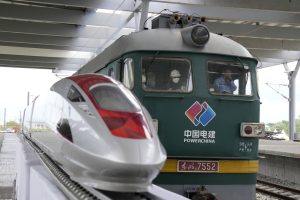The launch of Indonesia’s China-backed high-speed railway has been delayed by several weeks so that the consortium that is building the project can run some final safety tests, it announced yesterday.
According to a report by BenarNews, the limited trial launch of the Jakarta-Bandung high-speed train service was set for August 18. This has now been pushed back until early September, because more time was needed for the safe operation of the trains, which are capable of running at up to 385 kilometers per hour.
“As the first high-speed rail link in ASEAN, operating the train requires very careful preparation. All aspects will be prepared properly to prioritize customer safety,” Eva Chairunisa, spokesperson for the Indonesian-Chinese consortium PT Kereta Cepat Indonesia China (KCIC), said in a statement yesterday, according to the Jakarta Post.
“Every aspect will be well-prepared, with a primary focus on safety and comfort for the high-speed train passengers,” said the statement from KCIC, which is made up of four state-owned Indonesian companies and the China Railway International Co. Ltd.
“The trial of facilities and infrastructure has been carried out successfully. Currently, KCIC is also ensuring that all supporting operational elements will function properly when the train is operational.” In separate comments to BenarNews, Chairunisa said that there will be no delay in the full operational launch, which is scheduled for October 1.
The 142-kilometer rail line is set to link the capital Jakarta to the city of Bandung in West Java, greatly easing congestion along one of the most densely-populated travel corridors in the world. The line also has the distinction of being the first high-speed railway in Southeast Asia; the China-backed railway in Laos, which began operations in late 2021, is often referred to as high-speed, but has a maximum top speed of 160 kilometers per hour.
This minor delay comes after a series of delays and cost overruns that have slowed the project since its inception in 2015. At the time, the project was initially slated to be completed by 2019, at a cost $5.5 billion. That has since increased considerably due to mostly predictable factors involving complications in land acquisition.
In 2021, President Joko “Jokowi” Widodo announced that his government would use the state budget to cover the excess costs of the project, overriding a 2015 decree that barred the use of state funds in the construction of the railway. In February, the Indonesian and Chinese governments in Beijing agreed on a cost overrun of 18 trillion rupiah (around $1.2 billion), down from the more than $2 billion previously expected.
Despite the generally negative tone of the media coverage of the project – and there are many legitimate questions about the project’s design and implementation – the completion of the Jakarta-Bandung railway will mark both a milestone for China’s Belt and Road Initiative in Southeast Asia and for Jokowi’s two terms in office, during which time he has prioritized the improvement of Indonesia’s infrastructure.






























